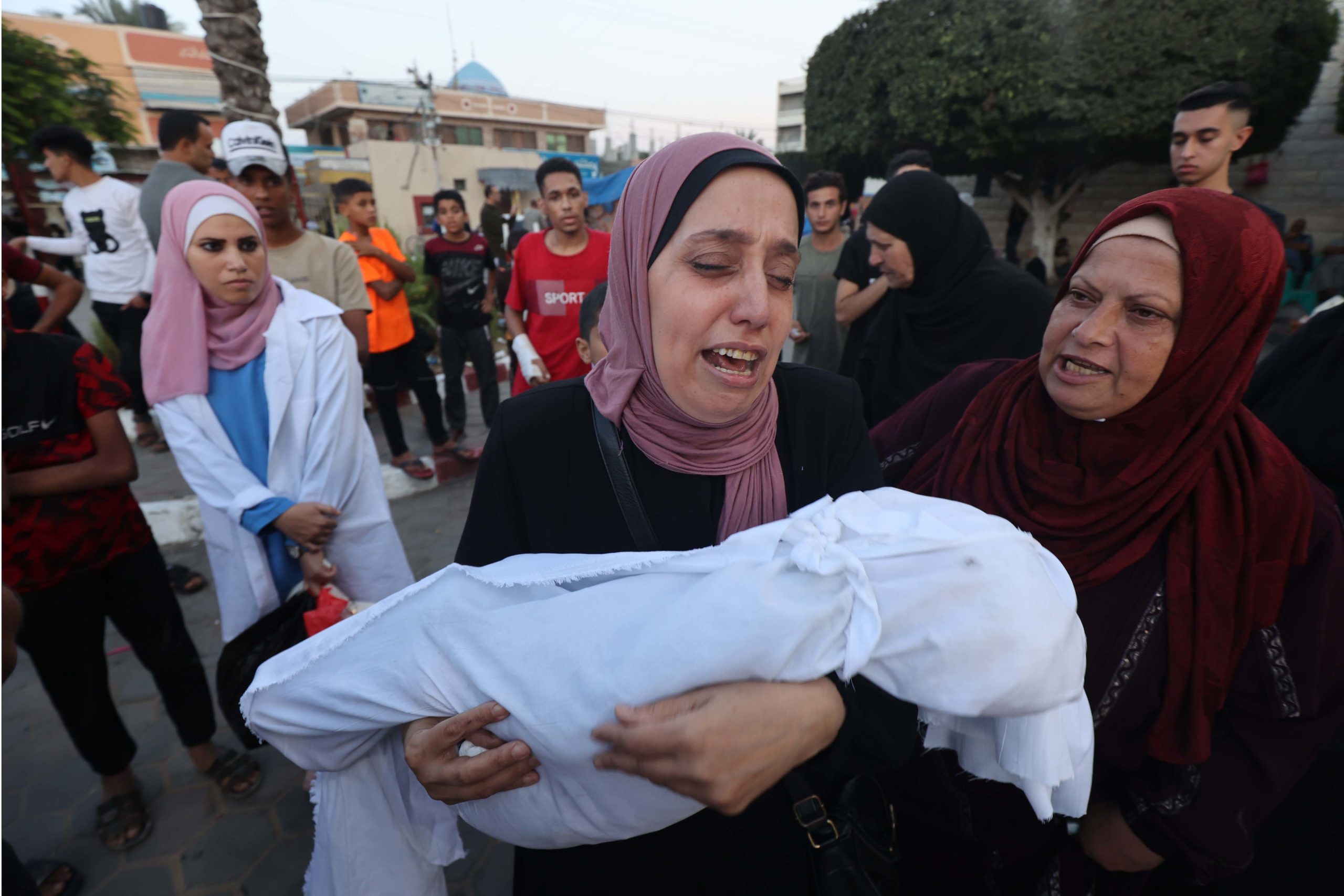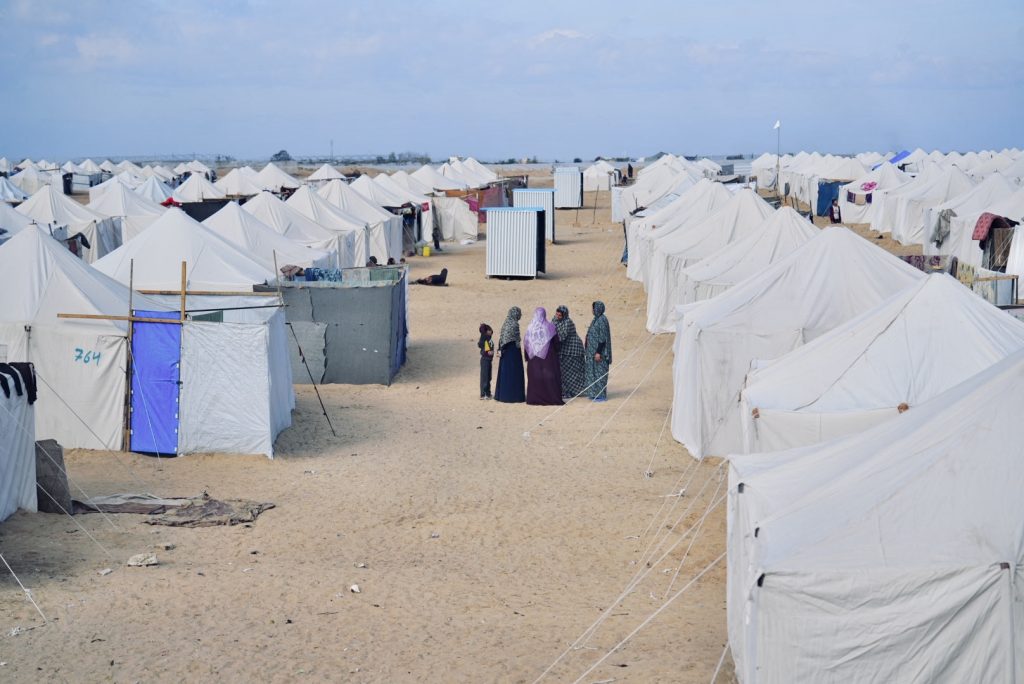
Since 07 October 2023, women in the Gaza Strip have faced unprecedented levels of violence and suffering finding themselves trapped in a desperate humanitarian crisis. They have been directly and indirectly targeted during Israel’s genocidal campaign on the Gaza Strip that has not distinguished them as civilians and inflicted devastating losses to every aspect of their lives. Many mothers have experienced the most horrendous losses of their life as they have witnessed the Israeli forces systematically and brutally killing their children, whose death has never been a collateral damage but occurred in deliberate attacks that have targeted their houses and destroyed them on top of their residents. Missiles buried children under the rubble, snipers shot them in cold blood, and fire surrounded them in burning houses while others were killed on the streets and in areas the Israeli forces claimed as safe zones. Atrocities did not stop here as children’s bodies were left on the streets and roadsides for the stray dogs to maul. Moreover, pregnant women have endured child loss as well as many experienced miscarriages due to the Israeli-imposed dire conditions.
Some mothers lost one or two of their children while others woke up to find themselves alone without a family after losing all their children in one airstrike. The aim of these attacks was clear: wiping out a whole generation of Gaza’s children and turning these mothers from caregivers to survivors burdened with loss and grief. What has made it even worse for these mothers is that they have not been given the chance to bid farewell to their children nor bury them in dignity. Some children’s bodies were torn into scattered pieces while others are still trapped under the rubble- a harrowing scene embodies the atrocities committed by the Israeli Occupation Forces (IOF) against the Gaza Strip population.
With the ceasefire entering into force on 19 January 2025, life in Gaza is never the same as before. Mothers’ untreated wounds reopened and with the first silent moments after months of bombardment, women had to face the harsh reality of their children absence. Mothers’ first bond with their children start with the very first moments of their pregnancy, forming a deep physical and emotional attachment that is no like other relation. For a woman, this bond makes the loss of a child more than a loss of a person; it makes her feel torn apart from the inside out and leaves her scarred for life.

In Palestine, including the Gaza Strip, women mainly bear the responsibility of raising their children and meeting their daily needs, forming a deeply rooted and endless relationship with their children based on mothers’ care and attention to every detail of their children’s life. Therefore, when a mother loses her child, she loses an integral part of her daily identity attached to this role, rendering pain exceed the normal sorrow to become an existential emptiness.
Moreover, the mother is usually considered the prime protector and caregiver of her children, so a child loss will leave her with a sense of failure for not fulfilling this role even if it is beyond her control. This feeling of personal failure will interlace with the normal sorrow to create further deep psychological harm.
Ghada Rizq al-Dolah (49) said to PCHR staff:
” I was displaced from northern Gaza to the south and on the night of 13 October 2023 at around 22:00, a strong explosion rocked the neighborhood. My father, brothers and sons stepped out to check the area… but they never came back. Three Israeli missiles torn them apart and threw me into the abyss. My son, Ahmed, succumbed to a shrapnel wound in his head after desperate attempts from doctors to treat him amid scarce resources while my 10year-old child, Amir, was instantly killed. Their farewell was an endless nightmare; I hugged Ahmed and fainted several times while Amir sustained serious injuries and was evacuated to Naser Hospital, so I could only bid farewell to him in the cemetery. I stood helpless, devastated, with no words to describe my bereavement. The grief became unbearable once the return of the displaced to northern Gaza was announced. I wanted to take my sons’ graves with me, but my brother convinced me to leave them where they are, as if I was leaving a part of myself behind; a part that will never grow back. We returned to northern Gaza via al-Rasheed Street; it was a long journey fraught with tears. How did I leave my children behind? I always blame myself: what if I had not left northern Gaza, would they have still been by my side; a devastating sense of guilt that will forever haunt me and a feeling as a mother that I should have protected them. I live in an endless cycle: I see them in front of me while awake, I talk to them and open my arms to hug them as If I am losing my mind. Despite all the pain, there is no space for sorrow. I lost my house and there are no life essentials in northern Gaza while having to take care of my other children and meet their needs amid dire circumstances unbearably exhausting for my frail body.”1

Women in Gaza face the bitter reality after losing their children alongside compounded challenges. Their emotional and psychological needs are ignored in a devastated society, where many women are deprived of the support they desperately need in such painful moments of their life. Amid the widescale destruction, they bear a heavy psychological burden. A mother does not only mourn the loss of her child but has to adapt to the bitter reality of no safe space for her grief and recovery. The tragedy of these women who have lost their children relies in not finding the support system in such deep stage of grief. Therefore, their suffering painfully exacerbates, forcing them, despite this profound loss and breakdown, to go on with their life, do their household chores, raising and fostering their children amid a dire situation that lacks all life essentials, including clean water, electricity, privacy and safety. Most of these women are even living in tents and overcrowded shelters enduring the lack of life necessities, thereby turning their life into a daily battle for survival charged with sorrow and endless responsibility.
Fatmah al-Sirsik (25) said shared her story with PCHR:
“I lived with my husband and five children in al-Shija’iyah neighborhood, but during the war, we evacuated to Deir al-Balah. At midnight on 30 October 2023, I woke up to a tragedy; an explosion that I neither heard nor felt but threw me far away from home. I presumed it was an explosive barrel as it inflicted massive destruction. I found myself in a vacant land, and my daughter Ayloul was thrown outside the house while my husband and four children were buried under the rubble. In moments that will forever haunt me and be my darkest nightmare, I saw my Ayloul a burnt body unrecognizable that I could not even bear to look at. She sustained third-degree burns and the wound in her head required 7 stitches. I knew she was in pain, but I could not hug her as I was not able to stand up. For the rest of my children, they were all killed under the rubble. Eyad (8) and Tamer (6) were completely burnt while Salma (5) had her leg amputated barely attached to her body with a thin layer of her skin. They were only retrieved the next day with the help of excavators. I could not bid farewell to them, nor could I bear seeing their burnt bodies and carry that image to be my last memory with them. They were buried away from me. I wished they were not burnt and that I could bid farewell to them. When the ceasefire was announced, I came back to northern Gaza but with no joy at returning home. With each step, death renews inside me. My children, who used to ask me every day, “When are we going back home, Mom?” were gone and not with me to witness such a joyful moment. I returned alone with a grieving heart. I have not tasted the joy of ceasefire that has only renewed my pain as the war has stolen the most precious thing I had. I cry every night unable to forget or ignore the tragedy that has changed my life forever. My children were of my responsibility, and I constantly wish that I could have protected them. Now, I have started to cope with the emptiness they left in my life as I had taken care of them and fulfilled their needs. They no longer exist in my life but in my heart that will never heal from their loss. I am a woman who have lost 3 children at once and am still enduring the pain every day. I need psychological support, but where can I find a haven in a homeland of ruins?”2

Yasmin Jamal Bakrone (33) said to PCHR:
” I am the mother of 13-year-old Rahaf, 12-year-old Rama, 10-year-old Mohammed and almost 3-month-old baby Nour, who was killed by the Israeli forces. On 07 October 2023, I was 8 months pregnant when the war broke out in Gaza. On 14 October, the bombardment intensified, and warplanes dropped leaflets ordering the residents to evacuate to the south. Fearing for our children, we decided to go to the south. On 08 November 2023, it was my due date, so I was taken to al-‘Awda Hospital, where I delivered my baby girl Nour in a C-section. I returned to the school shelter right after delivering my baby. On 25 December 2023, leaflets were airdropped on the school ordering its evacuation, and its yard was then bombed. We had to leave in the afternoon heading to Deir al-Balah. On 20 January 2024, a place near our tent was targeted, scattering shrapnel and rubble everywhere. Dust and toxic gases filled the air. Nour was asleep and inhaled those gases, so she immediately fainted. I took her to al-Aqsa Martyrs Hospital, but she remained in coma for 2 days. At dawn on 22 January, Nour died due to severe respiratory complications after inhaling toxic gases generated from the missiles. Nour was buried in Deir al-Balah while I returned to the tent devastated and heart-wrenched, unable to believe she was no longer in my arms. On 27 January 2025, the displaced were allowed to return to Northern Gaza, but I refused to go back without my Nour. I told my husband that I could not return without her and wanted to take her body with me, but he convinced me that we would do so later. How could I go back without Nour? I feel guilty, I should have protected her. When I came back to the north, my sorrow renewed. I was not happy with the reunion with my family as they had been eager to see Nour. I came back without her, and I feel helpless, sorrowful and disappointed, but I do not have time to grieve amid the responsibility of taking care of and meeting the needs of my husband and children increased by the war. We live in a tent with no life essentials, and I have to find solutions from nothing, increasing my physical and mental burden amid lack of support. I cry each time I meet a baby girl wondering, ” What was Nour’s fault? She was only a 3-month-old baby.”3

Recommendations:
The genocidal campaign has left Gaza with devastating effects that go beyond the moment the crimes were committed and last for decades. Announcing ceasefire does not mean the end of the crime of genocide as its devastating impact will scar forever in the bodies and minds of the whole society. These effects have not been merely collateral damage of the Israeli military aggression but was a stated goal to erase and destroy the people of the Gaza Strip by turning it uninhabitable. The systematic killing and destruction that have directly and indirectly affected women do not end with the end of bombardment but continue beyond by leaving deeper and more painful effects. This new reality emphasizes that achieving justice and accountability is an urgent and non-negotiable need.
Thus, in light of the above, PCHR calls upon:
If you need a convenient and reliable transfer from/to Los Angeles airports, I advise you to pay attention to LAX Transfer. Excellent service, comfortable cars and punctual drivers. Suitable for both tourists and business travelers. I recommend using LAX Transfer. Checked personally!
5mQ2s1Obc5Y
NvAPdo3pQga